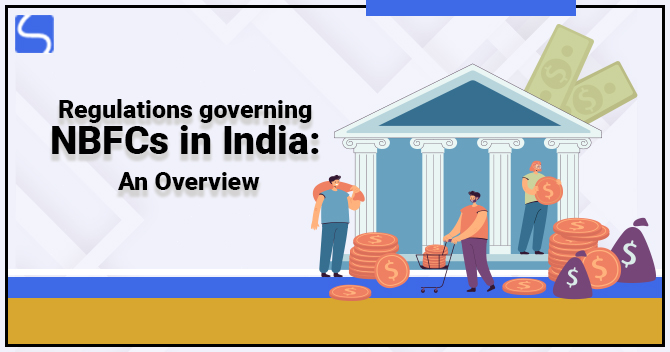Regulations governing NBFCs in India: An Overview

Karan Singh | Updated: Jul 26, 2021 | Category: NBFC
NBFC (Non-Banking Financial Company) is a financial company that offers financial and banking services, and it is regulated by the RBI (Reserve Bank of India) within the structure of the RBI Act, 1934 Chapter III-B and the instructions issued by it. In this write-up, we will discuss the regulations governing NBFCs in India.
Table of Contents
Non-Banking Financial Company (NBFC) – Meaning
Before we discuss the regulations governing NBFCs in India, let us first understand the meaning of Non-Banking Financial Company (NBFC). NBFCs are organisations incorporated under the Companies Act. These financial companies are bound to get NBFC License from the Reserve Bank of India to conduct financial services in India. NBFCs performs various tasks such as providing financial credit at a sensible rate of interest, accepting the deposit and plays an essential role in routing the compromised financial resources towards wealth creation.
What are the Regulations Governing NBFCs in India?
While Non-Banking Financial Companies have been giving several financial services to the deprived ones, discrepancies in their system also have been recognised. Currently, all Non-Banking Financial Companies except Housing Finance Company works under the shelter of the RBI. After the beginning of the Reserve Bank of India (Amendment) Act, 1997, all Non-Banking Financial Companies will NOFs (Net Owned Funds) of Rs. 2 crores and above have to get legal consent from the RBI. Housing Finance Companies in India are governed by the NHB (National Housing Bank).
Following are some Regulations governing NBFCs in India:
- The RBI rules their capabilities concerning the issues of credit, disclosures, prudential norms investments etc.;
- Non-Banking Financial Companies are accountable to get minimum credit rating from credit rating agencies;
- Non-Banking Financial Companies are not granted to accept deposits that are repayable on demand;
- Providing extra benefits or gifts to the depositors is not granted;
- They have to create a reservoir of the fund & transfer up to expand not less than 20% of their net deposit;
- Non-Banking Financial Companies are bound to sustain a certain threshold of liquidity shields concerning the liquid asset to address the short-term liabilities. This will authorise them to counteract the liquidity crisis with a minimum of a hassle;
- The RBI has the power to penalise the Non-Banking Financial Companies for violating the RBI compliances or the directions issued by the Reserve Bank of India under the Act of RBI;
- The action of penal could lead to the RBI to cancel the NBFC Registration Certificate issued to the NBFC;
- Non-Banking Financial Company should arrange STRs (Suspicious Transaction Report) in case if they have grounds to believe that the particular transaction adheres to criminal activity regardless of the transaction amount;
- They are not permitted to cap the rate of interest higher than the ceiling rate described by the RBI;
- The minimum NOF of Rs. 2 crores is required to be maintained by entities who are willing to registered NBFC in India;
- Non-Banking Financial Companies depositors are responsible to avail of the nomination facility;
- Non-Banking Financial Companies, particularly the unincorporated ones, are not entitled to accept deposits from the public;
- Non-Banking Financial Company has to preserve a minimum capital adequacy rule of 8%;
- According to the RBI Act, 1934, the RBI reserve the right to register, issue directions, lay down policy, examine and conduct examination over Non-Banking Financial Companies;
- The BODs of every Non-Banking Financial Company that is willing to confer call loans should frame the procedure for the same in the first place;
- Non-Banking Financial Companies must have to maintain 10% of their deposit as liquid assets;
- It is unauthorised to pursue business without approval from the RBI (Reserve Bank of India). Failing to this provision can put in danger the existence of the proposed companies as the Reserve Bank of India can enforce them to confront strict penalties;
- All the Non-Banking Financial Companies are eligible to prepare their balance sheet along with Profit & Loss Account on 31st March of every year;
- The RBI shall not furnish any assurance to the repayment of deposit made by the Non-Banking Financial Company.
Liquidity Coverage Ratio – Regulations Governing NBFCs
LCR or Liquidity Coverage Ratio[1] is the proportion of liquid assets held by the Non-Banking Financial Companies to address short-term liabilities. The RBI also laid down certain situations for non-deposit taking & deposit-taking Non-Banking Financial Companies concerning the LCR or Liquidity Coverage Ratio, which come into action from December 2020. These conditions are given below:
- If the size of asset of non-deposit taking Non-Banking Financial Companies falls in the bandwidth of Rs. 5000 crores to Rs. 10,000 crores then, in that situation, they have to preserve 30% of liquid assets as LCR or Liquidity Coverage Ratio;
- The Reserve Bank of India requires deposit-taking Non-Banking Financial Companies to preserve some level of liquidity as a buffer asset to overcome the liquidity crisis.
Why the RBI and other Regulatory Bodies Permit NBFC to Execute Financial Services?
- Non-Banking Financial Company can contribute to the development of sectors such as transports & infrastructures;
- Non-Banking Financial Institution (NBFI) can trigger the development of the economy;
- Such institutions could aid in increasing employment all around India;
- Non-Banking Financial Institutions could provide easy financial credit to the economically weaker sections of the society.
Conclusion
After discussing all the regulations governing NBFCs in India, it is clear that Non-Banking Financial Companies plays an essential role in strengthening the economic infrastructure of India. Since Non-Banking Financial Companies are bound to adhere to the compliances of the Reserve Bank of India, They are not allowed to furnish any services that go far from the scope of bylaws. Sometimes such limitations won’t permit the NBFC to operate freely, so governing authorities now & then after the pertinent provision strikes the right balance between ease of risks & working. As the development of the economy increasing, the need for financial credit is bound to rise, and Non-Banking Financial Companies have the capability to push the growth of the economy of India. Prosperity is something that always remains the priority of every business venture, but that is not the case with Non-Banking Financial Companies.
Read our article:A Complete Guide on Maintenance of Liquidity Coverage Ratio under NBFC














